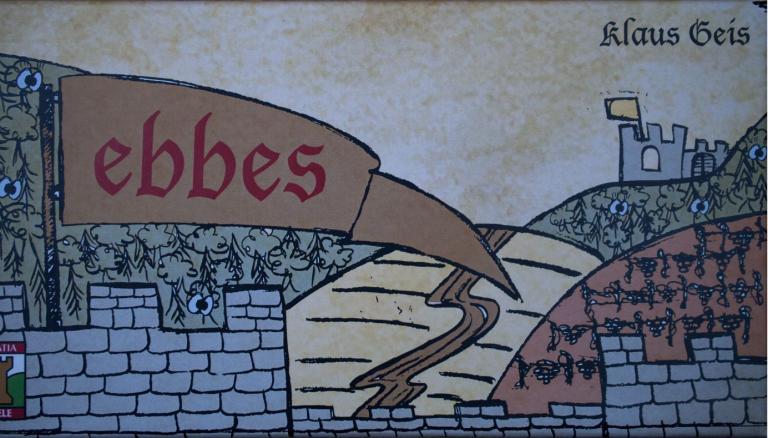ebbes

ebbes
In the trick-taking card game ebbes, players need to keep on their toes each round as how they're going to score (or lose!) points might not be determined until the round is well underway.
The deck in ebbes contains five colors of cards, and with three, four or five players, you use cards 1-6, 1-8 or 1-10. (Thus, each player is always dealt 10 cards.) In addition to the deck, you play with five number-designation cards (numbered 1-5), five color-designation cards that match the card colors, and a player aide board.
Game play follows the pattern of traditional trick-taking games. The lead player for a trick plays one card, and the other players must follow suit if possible, while throwing any other card if they can't. The highest card of the color led wins the trick, unless one or more trump cards were played, in which case the highest trump card wins the trick — but at the start of the round, trump is undetermined! To back up a step, at the start of the round, the first player reveals the top number-designation card; the numeral on that card helps determine trump as well as which cards earn or cost players points. If the number-designation card shows "7", for example, then the color of the first 7 played determines the trump color for the round; use a color-designation card to mark the trump color on the player aide. What's more:
The second 7 determines which color is worth positive points; each card of this color is worth 1 point at the round's end.
The third 7 determines which the "ebbes" color — "ebbes" meaning "something" in Palatine; at round's end, the player(s) who don't have the most or fewest cards of this color each earn 3 points.
The fourth 7 determines which color is worth negative points; each card of this color is worth -1 point at the round's end.
After four colors have been determined, the fifth color is automatically the "nix" color. Whoever has the most of these cards chooses the start player for the next round - after cards have been dealt for that round. At the start of the new round, reveal a new number-designation card. After all of the number-designation cards have been played — that is, after the fifth round — the game ends and the player with the most points wins.
Two variants are included with ebbes. The first variant extends the game (and probably lengthens the "determining" time) by adding more cards to the deck. In the second variant, players take turns placing a color-designation card on the number-designation card of their choice, and those five particular cards determine the colors for trump, positive points, etc. as each of them is played. The game's website gives rules for a third variant in which each player discards one card at the start of the round, and the player in last place gets to look at these cards; whoever takes the final trick takes these cards prior to scoring.
The deck in ebbes contains five colors of cards, and with three, four or five players, you use cards 1-6, 1-8 or 1-10. (Thus, each player is always dealt 10 cards.) In addition to the deck, you play with five number-designation cards (numbered 1-5), five color-designation cards that match the card colors, and a player aide board.
Game play follows the pattern of traditional trick-taking games. The lead player for a trick plays one card, and the other players must follow suit if possible, while throwing any other card if they can't. The highest card of the color led wins the trick, unless one or more trump cards were played, in which case the highest trump card wins the trick — but at the start of the round, trump is undetermined! To back up a step, at the start of the round, the first player reveals the top number-designation card; the numeral on that card helps determine trump as well as which cards earn or cost players points. If the number-designation card shows "7", for example, then the color of the first 7 played determines the trump color for the round; use a color-designation card to mark the trump color on the player aide. What's more:
The second 7 determines which color is worth positive points; each card of this color is worth 1 point at the round's end.
The third 7 determines which the "ebbes" color — "ebbes" meaning "something" in Palatine; at round's end, the player(s) who don't have the most or fewest cards of this color each earn 3 points.
The fourth 7 determines which color is worth negative points; each card of this color is worth -1 point at the round's end.
After four colors have been determined, the fifth color is automatically the "nix" color. Whoever has the most of these cards chooses the start player for the next round - after cards have been dealt for that round. At the start of the new round, reveal a new number-designation card. After all of the number-designation cards have been played — that is, after the fifth round — the game ends and the player with the most points wins.
Two variants are included with ebbes. The first variant extends the game (and probably lengthens the "determining" time) by adding more cards to the deck. In the second variant, players take turns placing a color-designation card on the number-designation card of their choice, and those five particular cards determine the colors for trump, positive points, etc. as each of them is played. The game's website gives rules for a third variant in which each player discards one card at the start of the round, and the player in last place gets to look at these cards; whoever takes the final trick takes these cards prior to scoring.
Player Count
3
-
5
Playing Time
45
Age
10
Year Released
2013
